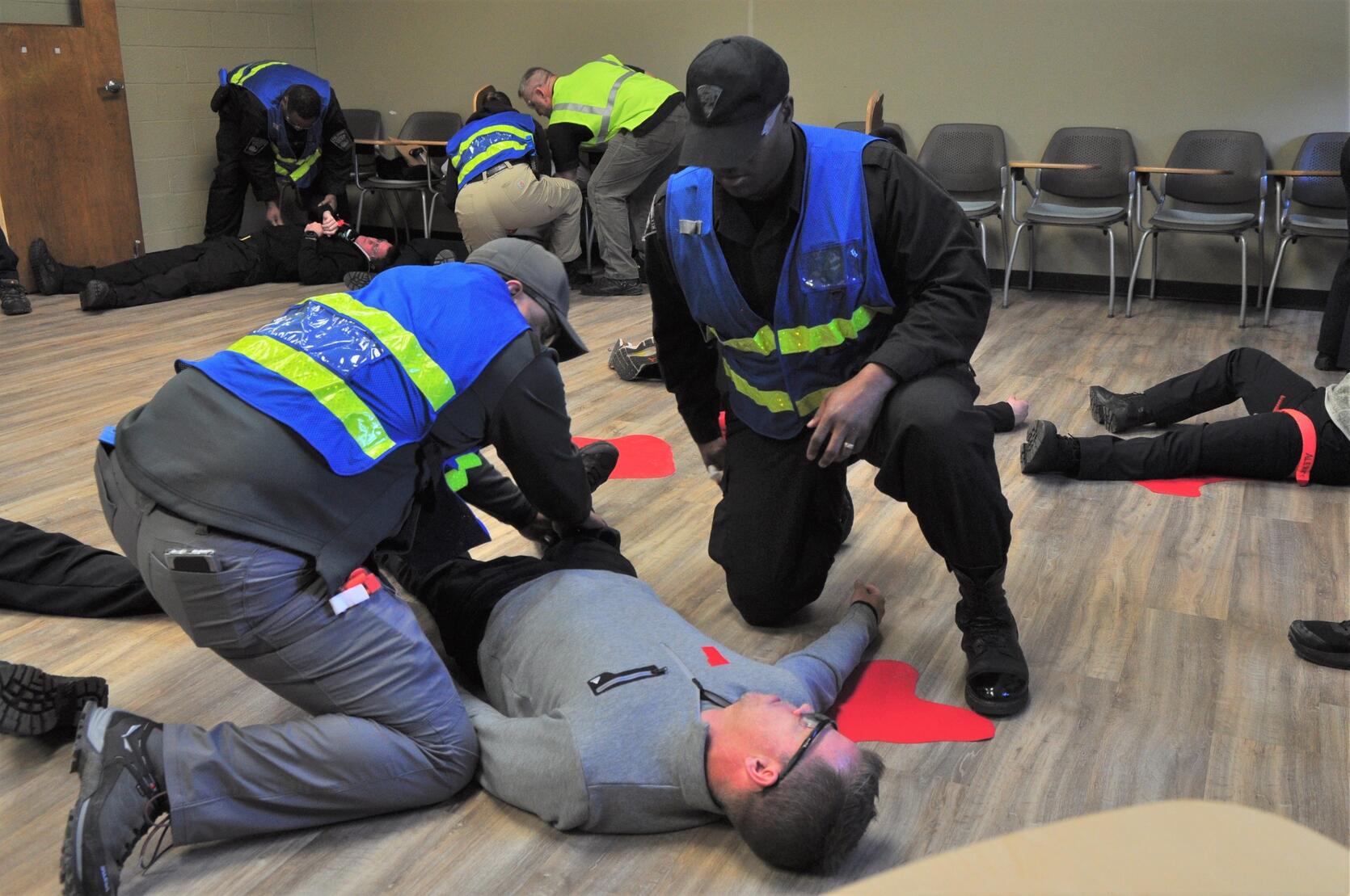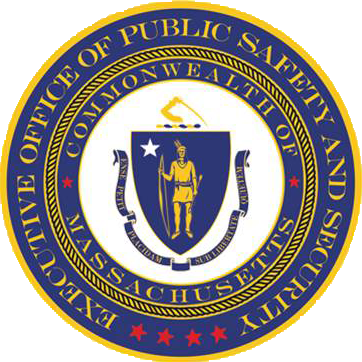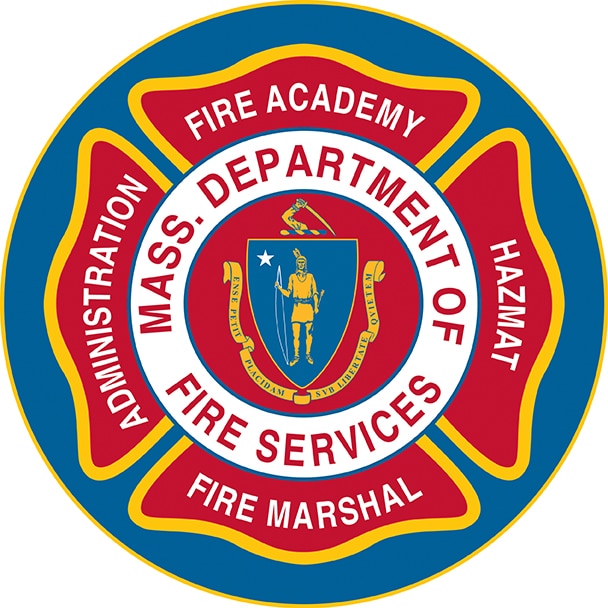- Executive Office of Public Safety and Security
- Municipal Police Training Committee
- Massachusetts State Police
- Department of Fire Services
Media Contact
Elaine Driscoll, Director of Communications and Policy

BOSTON — As part of the Commonwealth’s commitment to emergency preparedness and community resiliency, the Healey-Driscoll Administration will convene two advanced trainings for more than 90 cross-discipline first responders on NFPA 3000: Standard for an Active Shooter / Hostile Event Response (ASHER) Program, the adopted statewide framework for hostile incident response. The Executive Office of Public Safety and Security (EOPSS), in coordination with the Municipal Police Training Committee (MPTC) is hosting the weeklong train-the-trainer program to improve integration between police, fire, telecommunications dispatch, and emergency medical services and certify a cohort of qualified instructors to teach the model standard to other first responders and community partners across the Commonwealth.
The state’s ability to sponsor these comprehensive training exercises and implement the ASHER standard successfully depends on the funding recommendations of the Administration’s Fiscal Year 2024 (FY24) budget. The Administration’s proposal, which provides a 5% increase across the Public Safety and Security Secretariat, ensures the MPTC, Department of Fire Services (DFS), Massachusetts State Police, Massachusetts Emergency Management Agency (MEMA), and State 911 can support local community partners, procure needed equipment resources, and implement ASHER training.
“Massachusetts has a proud history of strong relationships among state and local emergency responders, and our Administration’s first budget reflects our dedication to continue building those partnerships,” said Governor Maura Healey. “Our investment in training will bolster our first responders’ collective ability to prepare for, prevent and respond to emergencies while strengthening public safety in communities across the Commonwealth.”
“Our FY24 budget invests in our values and reaffirms our commitment to keeping communities safe,” said Lieutenant Governor Kimberley Driscoll. “I commend this collaborative approach to emergency preparedness and know this vital effort will strengthen the remarkable partnership demonstrated consistently by our state and local public safety agencies.”
The MPTC will deliver this month’s Active Attack Integrated Response Train-the-Trainer Course in partnership with the ALERRT (Advanced Law Enforcement Rapid Response Training) Center at Texas State University, recognized in 2013 by the FBI as the national standard in active shooter response training. Participants will train over five days on location at colleges in northeastern and western Massachusetts to learn about the NFPA 3000 standard, conduct full-scale exercises, and practice teaching techniques to deliver the curriculum. At the conclusion of the two training sessions, the Commonwealth will have 90 certified instructors representing state and local police, fire, emergency medical services and 911 telecommunicators.
“Recent national events provide a tragic and urgent reminder that no community is immune from the unpredictable and devasting impact of an active shooter or hostile event crisis. The need for a pre-planned, integrated response across all first responder disciplines has perhaps never been more important than today,” said Secretary of Public Safety and Security Terrence Reidy. “Our experience in Massachusetts has shown that a unified approach and coordinated response saves lives and strengthens community resiliency.”
To advance its implementation in Massachusetts, Secretary Reidy directed state-run police and fire academies to adopt NFPA 3000 as the statewide standard for active shooter and hostile event response training. The Department of Fire Services, State Police, and MPTC continue to develop symmetrical ASHER training for police and fire personnel.
The NFPA 3000 standard was developed through consensus among stakeholders from law enforcement, the fire service, public health, emergency management, homeland security, and other disciplines. It identifies the minimum program elements needed to organize, manage, and sustain an active shooter and/or hostile response program and to reduce or eliminate the risks, effects, and impacts on an organization or community affected by these events. The framework emphasizes the need for interagency coordination when police, fire, and EMS responders are all deployed to the same critical incident, focusing on four main concepts: Whole Community, Unified Command, Integrated Response, and Planned Recovery.
“Our shared goal is to leverage every possible tool to mitigate emerging threats by ensuring the Commonwealth’s ability to plan, prevent and respond to crisis events,” said EOPSS Undersecretary of Homeland Security Jeanne Benincasa Thorpe. “On average, active shooter incidents end in under 6 minutes, but the event’s enduring impact on a community can last a generation. Recovery must start before an incident occurs. An integrated program and recovery plan will enhance public safety and improve outcomes for affected communities.”
“The MPTC is committed to working alongside our partners to train and deliver the ASHER statewide framework to communities across the Commonwealth. This model for cross-discipline collaboration ensures that emergency responders are educated, trained, and effectively prepared to respond to potential hostile events that will aid in keeping our communities safe,” said MPTC Executive Director Robert Ferullo (Ret. Police Chief). “The MPTC will continue its work to ensure the vital methodologies and best practices in these trainings are delivered to responders across the state.”
“Effective hostile event response requires first responders to work together across agencies and often across municipal lines,” said State Fire Marshal Peter J. Ostroskey. “As Massachusetts adopts NFPA 3000 as our statewide ASHER framework, joint training events like this one are vital to our goals of unified command and integrated response. Fire Academy instructors and local fire/rescue personnel are working alongside their law enforcement counterparts just as they would under real-world conditions. They’ll bring what they learn back to their academies and home departments to continue building that life-saving knowledge base across the Commonwealth.”
“Responding to incidents of mass violence requires the vital partnerships and collaboration among numerous public safety agencies,” said State Police Interim Colonel John Mawn Jr. “The time to formulate and train on that response plan is before any such incident occurs, and for that reason, the ASHER program is critically important for first responders.”
FBI data indicates that the US has experienced over 370 active shooter incidents in the last twenty years. These incidents have resulted in nearly 3,000 casualties, claiming the lives of 1,100 victims, including the death of approximately 100 members of law enforcement.
###



